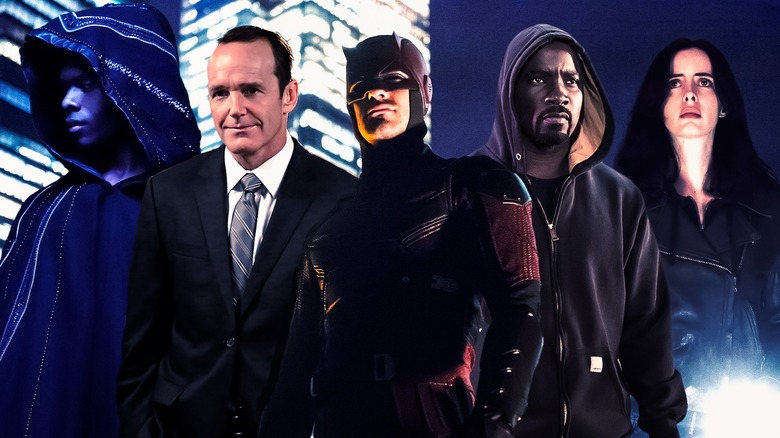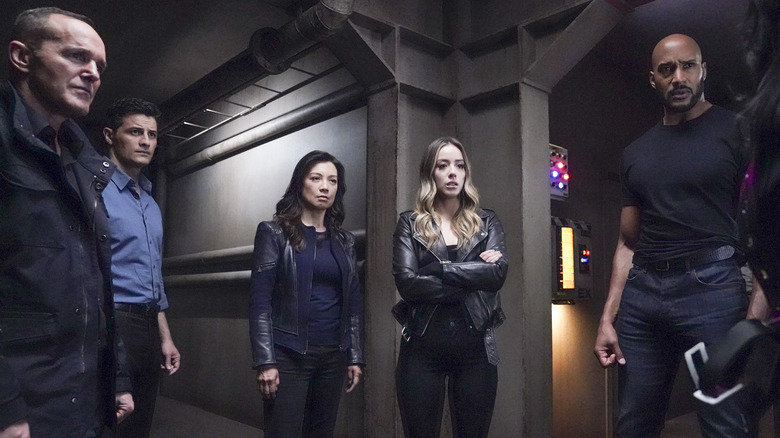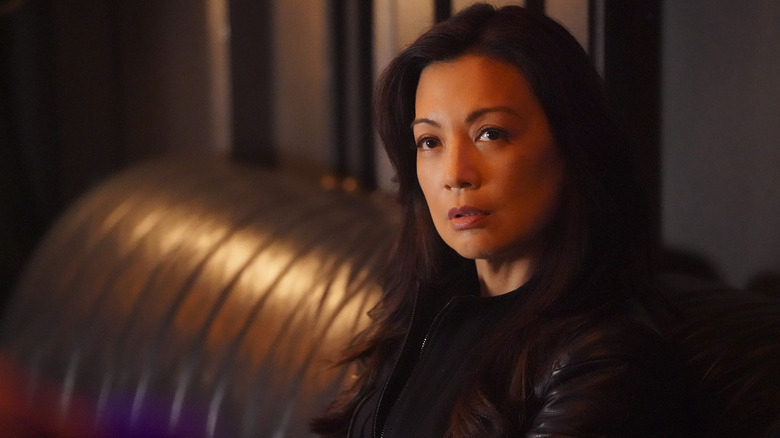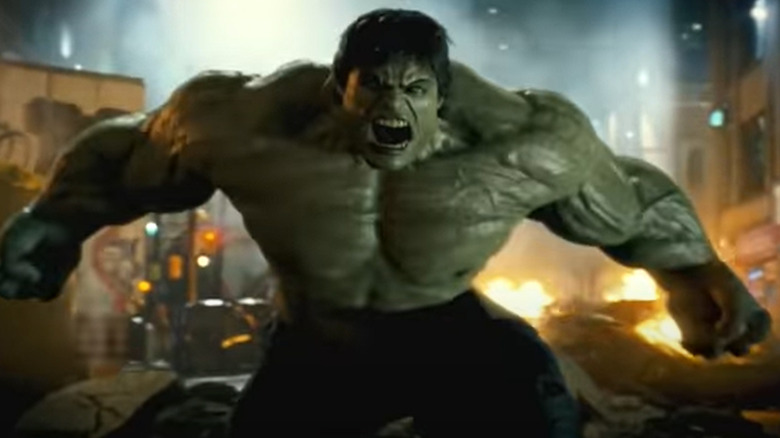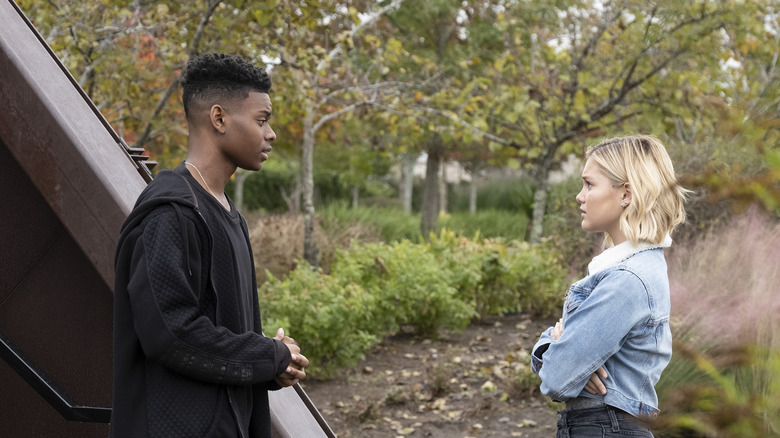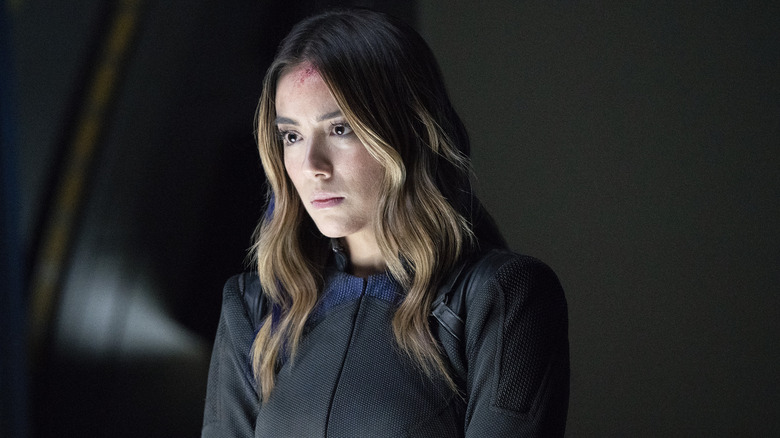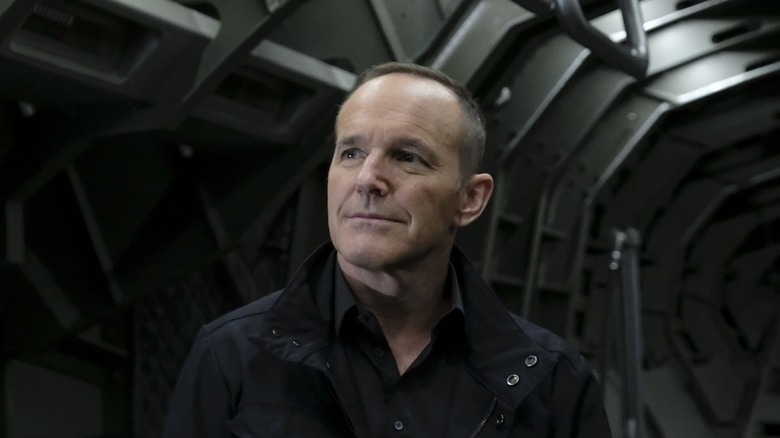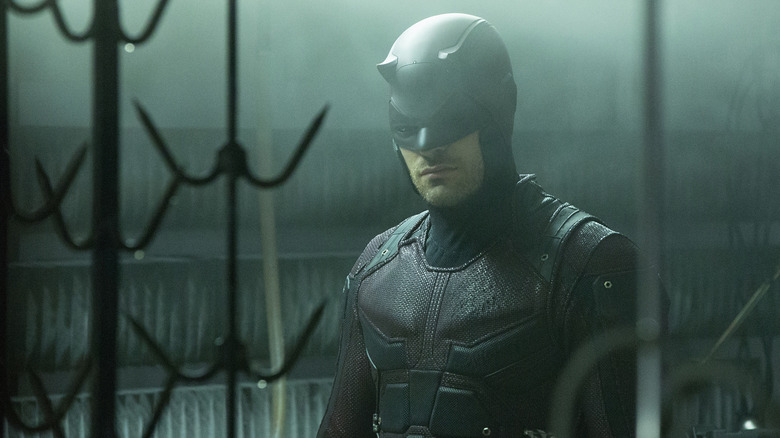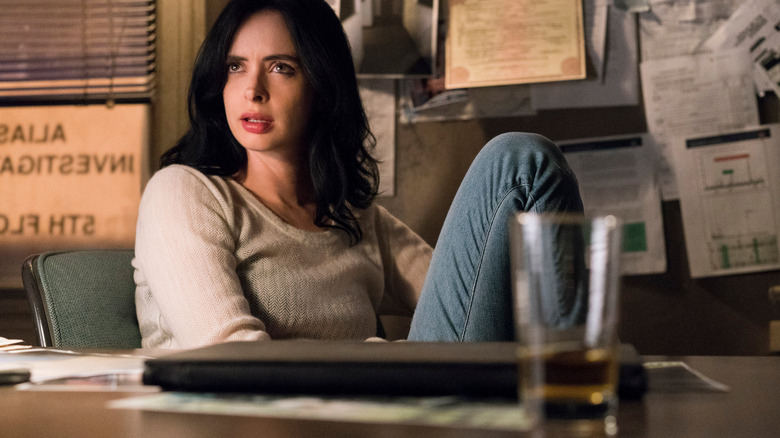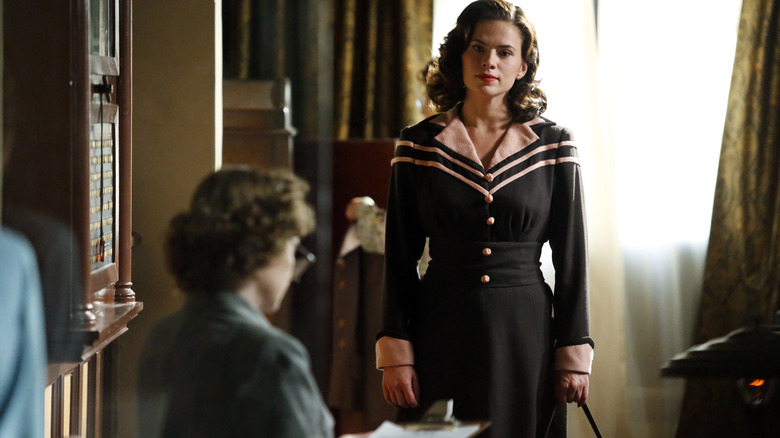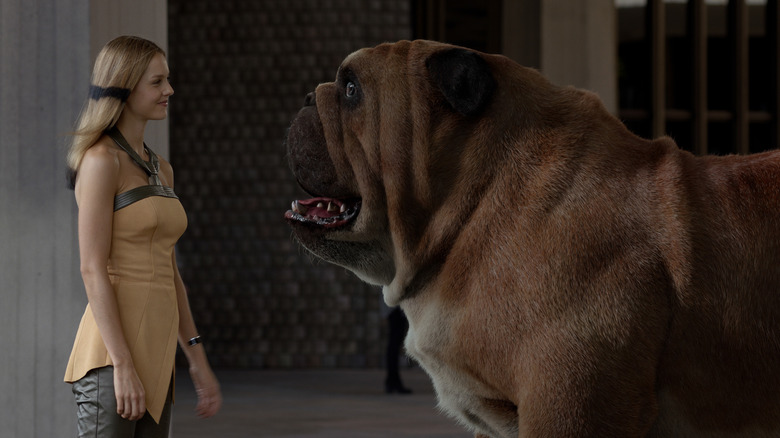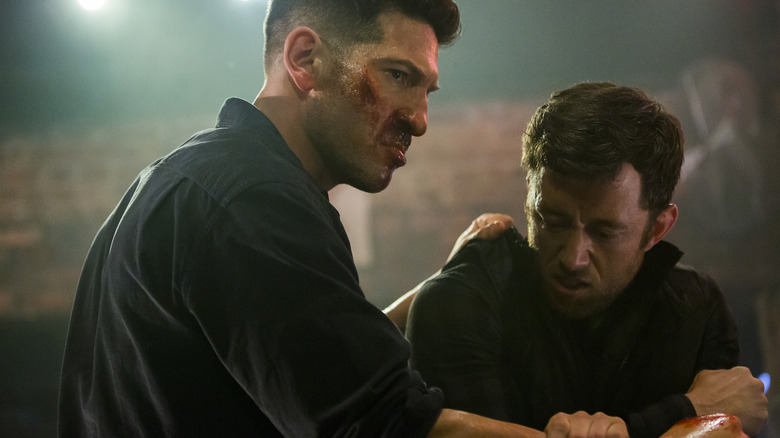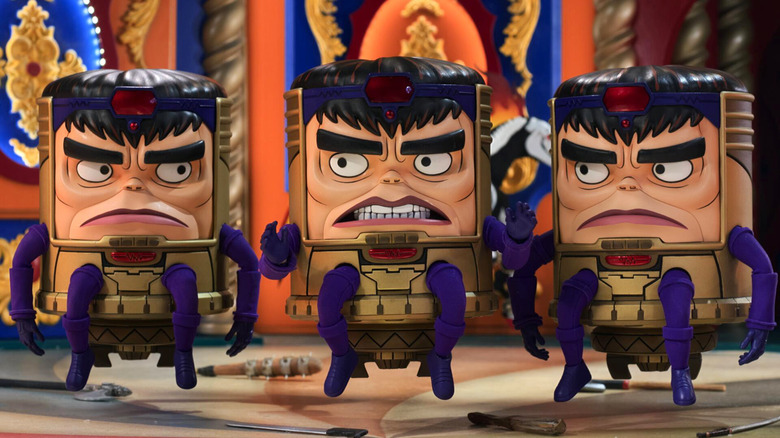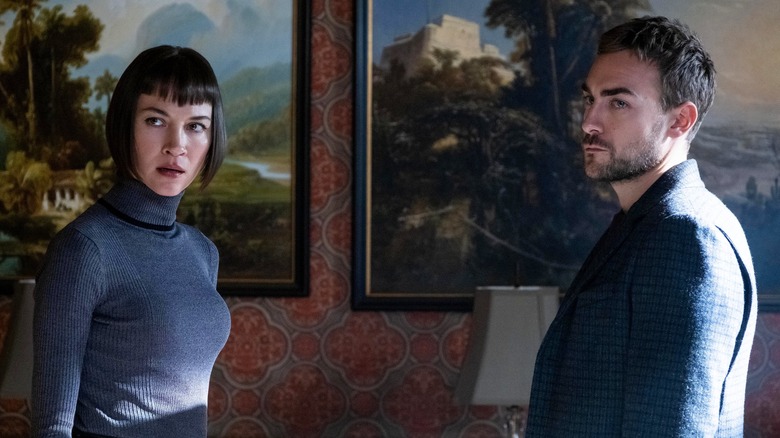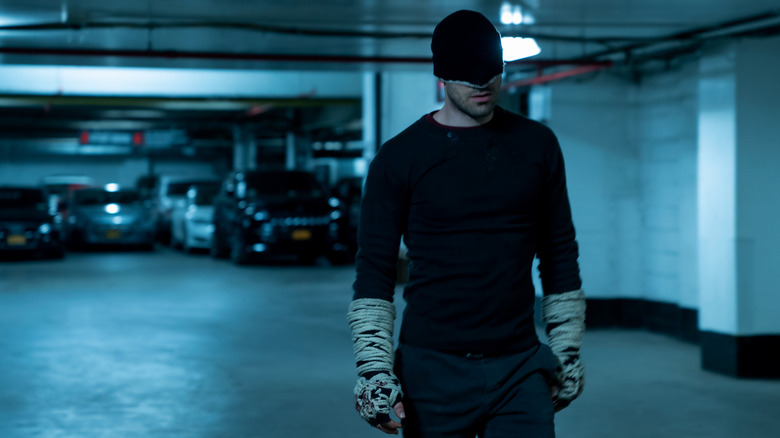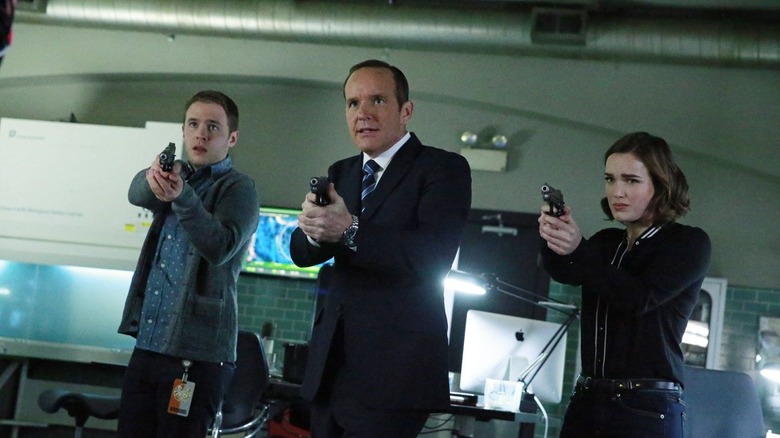The Complicated History Of Marvel Television Explained
We all know what Marvel Studios is. The extended logo for this company has become so famous and instantly recognizable on various movies and TV shows that it's hard to miss. But it's not the only outfit from Marvel that's ever produced a variety of popular live-action adaptations of beloved Marvel comics characters. Marvel Television, launched in 2010, was created in an era when Marvel Studios was only focused on big-screen excursions. Its endeavors include a swarm of Netflix programs, the long running "Agents of S.H.I.E.L.D.," and FX's acclaimed "Legion," among many other programs.
Marvel Television was shut down in December 2019, which means it didn't last as long as the still-perpetuating Marvel Studios, nor did it even approach the longevity of the comics divisions of Marvel. However, in those nine years, Marvel Television amassed a fascinating history. This history concerns everything from abandoned projects to what led to the demise of the various Netflix programs like "Daredevil" to the factors that eventually sealed the fate of Marvel Television. In its existence, Marvel Television produced a variety of programs which, granted, included some duds. However, many of its creative endeavors delivered robust entertainment to comic book geeks and general viewers alike. Though it's now a distant memory in the history of Marvel adaptations, Marvel Television can still provide some entertainment and thrills to people in the modern world thanks to the incredibly compelling history of its existence.
The birth of Marvel Television
In September 2009, Disney announced that it was purchasing Marvel, the entertainment company, at that point, usually associated with its comics division. Quickly, the Mouse House began to make some moves that would allow it to fully exploit its newest asset. This included launching Marvel Television in June 2010, which would be run by Jeph Loeb. Loeb's extensive experience working at Marvel, not to mention his contributions to the supernatural mega-hit "Lost," made him look like the perfect person to ensure Marvel Television found rampant success on the small screen.
Granted, Marvel's minimal forays into live-action television after "The Incredible Hulk" wrapped up in the early 1980s offered some reason for concern about how well this company's characters could be translated into this format of storytelling. In the late 2000s, the only successful show based on a superhero comic was The CW's "Smallville," a DC series that concluded its 10-season run in 2011. ("Arrow" didn't come along to redefine DC characters on network TV until 2012.) Marvel was not at all known for live-action television. But trepidations were clearly being tossed to the wind. This splashy announcement of Marvel Television's existence made it clear that Disney was gung-ho about this new division and all its possibilities.
ABC and high expectations
Launching Marvel Television was a demonstration of how Marvel as a company was evolving under its new Disney leadership. But this division was also being primed as a potential savior for another media entity Disney acquired over a decade earlier. By 2010, the ABC network wasn't in a tailspin, but it also wasn't in ideal shape. Though it had launched then-recent hits like "Modern Family," the network hit some embarrassing rating lows in 2009 while it came in behind CBS and Fox during the 2009-2010 broadcast season in terms of overall viewership. Plus, the finale of "Lost" airing in the spring of 2010 meant that this network required some new hit dramas. Disney didn't just want ABC to be seen as coming in ahead of NBC and The CW — it wanted this network to be a ratings juggernaut.
On paper, Marvel Television had the potential to provide new exciting programs for ABC that could secure the kind of rabid success and loyal fanbases that came naturally to many movie adaptations of Marvel characters. Of course, Marvel Television wouldn't be exclusively selling shows to ABC; the company was free to shop potential titles to any and all networks. But given that they shared a parent company, there was totally an expectation that Marvel Television would provide some hit shows for ABC. In addition to providing some corporate synergy, such a move could give the ABC network a new lease on life.
The Hulk that wasn't
In hindsight, it's quite amusing that one of the first major projects announced for Marvel Television was so rooted in the company's TV past. The Bill Bixby "Incredible Hulk" show had been a massive success in the late 1970s and early '80s; so naturally, Marvel Television pursued a new "Hulk" TV show for ABC. The prospect of kicking off a new age of small-screen Marvel programming with a character as recognizable as The Hulk was already an incredibly exciting prospect. To throw fuel onto the fire, though, it was eventually revealed that Guillermo del Toro and David Eick would be in charge of this new vision of The Hulk.
The concept of del Toro applying his love for monsters to a character like The Hulk sounds too good to be true. Unfortunately, the project never saw the light of day. After years of development hiccups, del Toro confirmed in 2013 to MTV that he still held an enormous passion for the project and wanted to make it a reality. However, at the time, he hadn't heard anything from Marvel brass on the production. He interpreted this lack of communication as a sign that the company had opted to focus on Mark Ruffalo's version of The Hulk rather than his incarnation of the character. Though it had lots of potential, Marvel Television's stab at The Hulk ultimately went nowhere.
The initial struggles of Marvel Television
At the 2011 San Diego International Comic-Con, Marvel Television showed off an expansive slate of upcoming projects including the original version of "Jessica Jones," "Cloak & Dagger," and "Mockingbird." Later that year, the outfit sold the Fox network on a "Punisher" TV show. This Disney division was getting quite busy and had lots of projects on its hands. The only problem was that nearly all these shows never happened. "Jessica Jones" and "Cloak & Dagger" appeared in radically overhauled forms years later, but their original incarnations fizzled out. Most other projects Marvel Television pursued, like the Fox "Punisher" show, never went anywhere.
The issue of actually getting exciting-sounding projects off the ground is a hurdle countless production companies face. However, Marvel Television was facing some specific issues. Superhero TV shows were just not seen as especially viable or enticing to the major broadcast networks in the early 2010s thanks to the failure of programs like "No Ordinary Family" and "The Cape," not to mention the DC Comics adaptation "Human Target" and the profoundly mixed results of NBC's "Heroes." There had been hits in this subgenre before, but at that moment, it looked like superhero entertainment was best left to movie theaters. While programs like "Arrow" and eventual fully realized Marvel Television productions birthed a new era for superhero programming down the line, before then, Marvel Television struggled to get its ambitious small screen plans off the ground.
Agents of S.H.I.E.L.D. links up with the MCU
By July 2012, "The Avengers" had not only cemented the popularity of the Marvel Cinematic Universe, but it had also taken the franchise to new levels of prominence. Being the first entry in the franchise to crack $1 billion worldwide, "The Avengers" reached new levels of financial success for any superhero movie. Other divisions of Marvel, seeing dollar signs dancing around anything even tangentially connected to the name "Avengers," were eager to cash in on this newfound popularity. This included Marvel Television, which announced, just a few months after "The Avengers" debuted that it was developing an ABC drama connected to this feature.
At the time, the very concept of what this program would be was nebulous and its connections to "The Avengers" were considered to be very thin. Still, having any kind of show rooted in the Marvel Cinematic Universe was an incredible get for Marvel Television. This connection expanded further when "Avengers" writer-director Joss Whedon was revealed to be involved with the show and would even direct its pilot.
Up to this point, most of the Marvel Television shows were set to be standalone enterprises. Now, this outfit could deliver a TV show for ABC that exploited the fascination mainstream audiences now had for interconnected superhero narratives. Eventually, this project's connections to Marvel Cinematic Universe endeavors would solidify once this production was revealed to be "Agents of S.H.I.E.L.D."
Agents of S.H.I.E.L.D. struggles with viewership
"Agents of S.H.I.E.L.D." arrived on ABC with lots of hype. How could it not? Debuting just 16 months after "The Avengers" and starring fan-favorite character Phil Coulson (Clark Gregg), the program was primed and ready to take advantage of people's love for the Marvel Cinematic Universe. Initially, it looked like Marvel Television's biggest swing yet was going to work, with the first "S.H.I.E.L.D." episode garnering massive ratings that put the viewership of all other network TV dramas in the preceding four years to shame. For a second, it looked like "Agents of S.H.I.E.L.D." was going to work both in translating the success of Marvel movies to the small screen and giving ABC its answer to big network procedurals like "NCIS."
Unfortunately, that momentum was never regained and the ratings for "Agents of S.H.I.E.L.D" quickly crumbled. By the time 2016 rolled around and the program was wrapping up its Season 3, outlets like Forbes were publishing pieces exploring why "Agents of S.H.I.E.L.D" was never able to be a consistent ratings juggernaut. Of course, ABC brass was clearly satisfied enough with the show's viewership to keep it around for seven seasons. Still, "Agents of S.H.I.E.L.D" never reached its fullest potential in terms of ratings, thus depriving Marvel Television of a pop culture phenomenon on par with Marvel movies like "Guardians of the Galaxy."
Marvel Television peaks with Netflix
There was a moment around 2015 when Marvel Television was truly rocking and rolling. This was the year the first two titles in its long-term partnership with Netflix, "Daredevil" and "Jessica Jones," launched. In late 2016, online rumors attributed a more than two-hour disruption in Netflix services to the platform's inability to withstand an onslaught of viewers tuning in for Season 1 of "Luke Cage." Probably, the Mike Colter-starring series didn't really cause the glitch, but the notion that "Luke Cage" was capable of literally crashing Netflix didn't sound remotely crazy; at the time, "Luke Cage" was extraordinarily popular. Over on ABC, "Agent Carter" and "Agents of S.H.I.E.L.D." were gearing up for new seasons while the network had just ordered a fresh new TV show from acclaimed screenwriter John Ridley. This was also the year when Marvel Television expanded its efforts beyond the Marvel Cinematic Universe to also make programs involving "X-Men" characters for networks owned by 20th Century Fox's parent company News Corp., which owned the film rights to the X-Men and Fantastic Four.
Under this agreement, Marvel Television got to branch out even further with the creation of "Legion" for FX while the company's collaborations with the Fox entities eventually resulted in the creation of "The Gifted" for the Fox network. A whole new roster of Marvel characters and the very concept of mutants were now at the company's fingertips. Marvel Television, to put it simply, was everywhere and making shows for multiple franchises. Plus, the outfit was creating programs for the traditional broadcast television world while also making projects for cable and streaming. Five years after its first launch, Marvel Television's initial struggle to launch anything seemed to be a thing of the past. Unfortunately, turmoil would soon arise.
Ike Perlmutter takes over
In August 2015, the balance of power in Marvel's entertainment divisions shifted. Kevin Feige and Marvel Studios would now be working under the then-head of Disney studios, Alan Horn, rather than the controversial CEO of Marvel Entertainment, Ike Perlmutter. Years later, Disney CEO Bob Iger revealed that this was done because Perlmutter threatened to fire Feige. With Iger and other Disney brass not wanting to lose a key creative voice behind Marvel's domination of pop culture, a drastic shift was needed. While this meant Perlmutter no longer had control over the movie side of Marvel, everything else at this company was still under his purview, including Marvel Television.
A few months after this news hit, the biggest consequence of Marvel Studios and Marvel Television being run by separate people was revealed by director Anthony Russo. This filmmaker, when asked if the various Marvel-Netflix characters could show up in projects like "Avengers: Infinity War," noted that the two Marvel divisions being run by drastically different people made that prospect a long shot. While there were initially indicators that small-screen heroes could interact with theatrical "Avengers" characters, this new status quo in terms of who controlled what at Marvel had annihilated those hopes. A new, more self-contained era of Marvel Television was about to begin.
The end of Agent Carter and Marvel's Most Wanted
In May 2016, a pair of developments provided a double dose of frustration for Marvel Television executives. First off, "Agent Carter" was canceled by ABC after two seasons. The ratings on the show had never been extraordinary, so it wasn't a massive surprise that "Agent Carter" wouldn't be running eternally. Still, the creative team had conjured up plans for what a third season could look like and the show's fanbase was dismayed to see Peggy Carter's solo exploits cut short.
The other discouraging development involved the demise of an "Agents of S.H.I.E.L.D." spin-off entitled "Marvel's Most Wanted" meant to be a solo vehicle for previous "S.H.I.E.L.D." lead characters Bobbi Morse and Lance Hunter. Even though it was an extension of a previously existing TV program on ABC, executives passed on "Most Wanted." Individually, neither of these developments is especially crushing. After all, no production company gets every potential TV show off the ground. But combined, this pair of cancellations concerning shows directly connected to the exploits of Phil Coulson and friends suggested that there was now zero chance of "Agents of S.H.I.E.L.D." becoming a sprawling franchise for ABC like "NCIS" and "CSI" were for CBS. The scope of this expansive universe was starting to shrink.
The Inhumans debacle
The Inhumans were originally set to headline their own Marvel Cinematic Universe movie set for a November 2018 and then a July 2019 release date. When those plans fell through, Marvel Television, which had been incorporating Inhumans lore into "Agents of S.H.I.E.L.D." since 2014, opted to take the Inhuman Royal Family and give them a show. The result of this effort was the ABC drama "Inhumans," which kicked off its existence by debuting two episodes shot with IMAX cameras in IMAX theaters Labor Day weekend 2017. It was a splashy way to kick off a costly Marvel Television enterprise that the company hoped could be a massive hit.
"Inhumans" didn't come close to fulfilling pre-release expectations, with the program sinking to abysmal ratings. Everything about the show, including a now-infamous scene where the teleporting bulldog Lockjaw gets run over by a dirt bike, became a source of ridicule for the few people who even watched this program. In May of 2018, "Inhumans" was unsurprisingly canceled. The demise of "Inhumans" was especially troubling since it was yet another Marvel-ABC production that went nowhere after "Agent Carter." Despite sharing a sizable parent company, Marvel Television and ABC just weren't working out well together as a media duo.
The rapid-fire demise of the Netflix shows
It all began with "Iron Fist." In October 2018, just a month after the show's second season debuted on Netflix, the news broke that "Iron Fist" wasn't returning for a third season. Considering that "Iron Fist" had become a punching bag for its dismal quality, the idea of Netflix jettisoning this program while keeping the rest of its Marvel programming intact wasn't far-fetched. However, "Iron Fist" was just the first in a string of Marvel shows canned by Netflix throughout the final weeks of 2018, with "Daredevil" failing to get picked up for a fourth season at the end of November 2018. By February 2019, the last two Marvel-Netflix shows standing, "The Punisher" and "Jessica Jones," were also canceled. The age of Marvel and Netflix collaborations that began in 2015 was now dead.
Speculation ran rampant on why Netflix canned these Marvel Television programs, with outlets like Forbes noting that the likeliest culprit for their demises was that Netflix didn't want to air projects anchored by characters associated with a then-forthcoming rival streaming service. Disney+ launched about a year after this swarm of Marvel-Netflix cancellations. Whatever the reason, this avalanche of bad news meant an especially prominent outlet for Marvel Television productions was now gone. It was time for this division to look for greener pastures in the world of streaming entertainment.
Hulu emerges as a potential savior
By 2019, the age of Marvel TV programs on Netflix had come and gone. But sometimes when one door closes, another one opens in the world of streaming. Just as the final seasons of the Marvel-Netflix shows were dropping, Disney acquired a significant amount of control over Hulu as a result of buying the various Fox media assets. This meant that Marvel Television had a new corporate sibling that could air new TV programs and, as a cherry on top, one that Marvel Television had already worked with years earlier through the program "Runaways."
It wasn't long into 2019 that Marvel Television announced a slew of programs for Hulu. The most prominent of these was a collection of animated comedies aimed at adults focusing on characters like M.O.D.O.K. and Howard the Duck. Much like the first live-action incarnations of The Avengers and The Defenders, these characters would anchor their own solo shows and then cross over for a larger team-up adventure. There were also plans for Marvel Television to provide live-action productions for Hulu in the form of shows like "Helstrom." Simply because they were following in the footsteps of the Marvel-Netflix properties, these prospective Hulu projects didn't seem quite as special as early Marvel streaming efforts. But the reveal of these shows reaffirmed that Marvel Television had found a new home for its creative exploits.
Plans for the Adventure into Fear franchise
Cartoons trying to be the next "Rick & Morty" or "Bojack Horseman" weren't the only things Marvel Television planned to offer Hulu. In May of 2019, Marvel Television announced further live-action projects with Hulu in the form of a pair of new TV shows — "Helstrom" and "Ghost Rider." These programs would explore the darker, more mature tone established by the various Marvel-Netflix productions while also embracing a fresh new horror atmosphere that hadn't been explored much in prior Marvel Television projects. Jeph Loeb confirmed that this corner of the Marvel Cinematic Universe was called "Adventures into Fear" in August 2019.
While it took years for the ambitious slate of Marvel-Netflix shows to crumble, Marvel Television's expansive plans with Hulu withered away after just a few months. The planned "Ghost Rider" program was canned in September 2019, a move that stunted plans for "Helstrom" to spawn various spin-offs and interconnected shows. Loeb was still reaffirming that the "Adventures into Fear" saga was happening as late as October 2019, promising that several other shows in this universe would be announced shortly. This ended up being one of the last gasps of Marvel Television as it existed up to this point, as the division changed forever just a few weeks after Loeb's comments.
When Marvel Studios took over Marvel Television
By October 2019, Marvel Television's output had slowed down considerably. Several planned Hulu shows were dead. Programs made in collaboration with 20th Century Fox entities like "Legion" and "The Gifted" had wrapped. The days of creating programs for Netflix were becoming a distant memory. There was even official confirmation that summer that "Agents of S.H.I.E.L.D." was finally coming to a close. Then there was the awkward news that broke around a year earlier involving Marvel Studios making TV shows for the Disney+ platform, a rumor that had been confirmed to be true and then some by fall 2019. The future of Marvel Television was looking uncertain, and it was only a matter of time before something drastic happened.
That drastic event turned out to be Kevin Feige amassing more control over various divisions of Marvel in October 2019. This included Marvel Television, which would now be a part of Marvel Studios rather than an autonomous branch of the Marvel corporation. A week after this news, the inevitable event of Loeb vacating his job as head of Marvel Television occurred. A new age had come for not only Feige but also Marvel Television. Whereas Feige was bound to endure now with all the control he'd secured, this promotion meant that Marvel Television wasn't long for this world.
The end of Marvel Television
The moment Feige assumed control of Marvel Television, there was no doubt that it would be quickly phased out. Now that Marvel Studios was producing small-screen entertainment for Disney+, it wouldn't make any sense for Marvel to have two separate divisions creating superhero storytelling for television. By December 2019, as expected, Marvel Television shut down. Marvel Studios brass declined to greenlight any new programs gestating at Marvel Television, and Marvel Studios carried the remaining Marvel Television projects like "M.O.D.O.K." and "Helstrom" to the finish line in post-production.
It was a development that ensured the demise of a few major shows. It also reaffirmed the focus of Marvel Studios on its exploits with big-budget TV programs starring actors from the various Marvel Cinematic Universe movies. The era of "WandaVision" and "Loki" was on the horizon and Marvel was keen to focus on that, rather than try to make more productions for ABC. This decision was understandable from a strategic and financial standpoint, but it didn't lessen the sting of all the lost creative opportunities.
Marvel Television's history reflects a decade of change in television
When Marvel Television first got off the ground in June of 2010, Netflix had never released an original TV show. Heck, "Agents of S.H.I.E.L.D.," the first major Marvel Television program, debuted just six months after "House of Cards" changed the trajectory of Netflix and premium television forever. Over its nine years of existing, Marvel Television experienced an incredible amount of upheaval that inadvertently reflected an extremely turbulent decade for television. At the start of Marvel Television's existence in the 2010s, the broadcast networks were still the de facto place for major all-ages programming to drop. If you were dropping scripted programming online, it was only something to either buy or rent on iTunes.
The burgeoning era of streaming entertainment, though, gave Marvel Television new outlets for its programming. At the time, its string of Netflix shows was emblematic of the excitement surrounding the emergence of various streaming titans. By the end of the decade, though, the streaming era that initially gave Marvel Television a new lease on life also sealed its doom. Its parent company, Disney, wanted its own streaming platform with extremely premium content that it owned exclusively. There was just no place for Marvel Television by the end of the 2010s, with the company reaping various benefits and drawbacks of the modern small-screen era during its existence.
